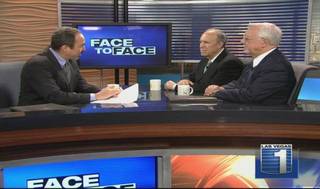Monday, March 16, 2009 | 2 a.m.
Sun Archives
On the Brink

Viewing video requires the latest version of Adobe's Flash Player
Tapped Out?

Viewing video requires the latest version of Adobe's Flash Player
Harrah’s Entertainment Chief Executive Gary Loveman once described CityCenter, built by competitor MGM Mirage, as “the sort of casino God would build if he had the money.”
Las Vegas’ casino giants did appear godlike before the recession. Theirs were among Wall Street’s highest-performing stocks, and they built on that success by constructing the world’s most expensive hotels.
In the haze of the ongoing economic hangover, these Las Vegas resorts — including some yet to be finished, such as CityCenter — look like the fevered dreams of out-of-control egos.
Indeed, casino giants are led by men with strong egos. An outsized ego and flair for showmanship are respected and encouraged in an industry that sells pleasure.
Yet it was primarily the lure of cold hard cash and future profits that led many of these executives down the wrong path. Although ego did play a role.
“We could describe a project almost anywhere in the world, show pictures of beautiful buildings designed by leading architects, and we would have banks lined up at the door prepared to lend money on that basis,” Loveman said in a recent interview with [email protected]. Carey, published by the W.P. Carey School of Business at Arizona State University.
Loveman said he was guilty of grabbing the cheap cash. “You’re looking at a guy who had his mouth in the trough on this to a fairly large degree,” Loveman told the publication.
So too are people “at every level of American life”, including homeowners and consumers, he said.
Americans were using rapidly inflating real estate values to fund their spending, some of which included trips here.
Las Vegas was the right kind of place at the right time.
Loveman’s statements might not sound like a mea culpa to people who have lost jobs, hours or benefits. Even some Nevadans are now taking secret pleasure in the industry’s fall.
Nor will executives find sympathy from those critical of Las Vegas, the conspicuous consumption it has come to represent and the inflated riches of its top executives.
Bill Eadington, director of the Institute for the Study of Gambling and Commercial Gaming at the University of Nevada, Reno, is one of the sympathetic ones. Gaming matured into a cutthroat business that “required bold action to stay ahead of the competition,” he said.
These actions, and the debt that funded them, now look foolish and damaging to employees and other stakeholders, he said.
But not all industry captains leveraged their way to the brink of bankruptcy.
While MGM Mirage, Harrah’s and Station Casinos aimed to dominate a market, operators such as George Maloof, Michael Gaughan and Steve Wynn focused on building single properties rather than acquiring empires.
Mandalay Resort Group executives Mike Ensign and Bill Richardson were called too cautious for selling their company to MGM Mirage in 2005, well before the growth wave crested. But their nervousness about the future, which seemed out of place at the time, now looks prescient.
Ego doesn’t always indicate an appetite for risk. Wynn and Bill Boyd — Boyd Gaming’s former chief executive and now a major shareholder — are at opposite ends of the ego spectrum, yet both companies are better-positioned because of a more deliberative approach to development. Analysts say Boyd Gaming would have been in trouble had the company continued work on its Echelon resort — a risky project it was smart to mothball in this economy.
Though it’s easy to blame gaming declining fortunes on arrogance, these executives were enabled by banks and a spendthrift public. It’s another reason some see Las Vegas, the epitome of conspicuous consumption in America, as a reflection of the country’s current troubles.

Join the Discussion:
Check this out for a full explanation of our conversion to the LiveFyre commenting system and instructions on how to sign up for an account.
Full comments policy